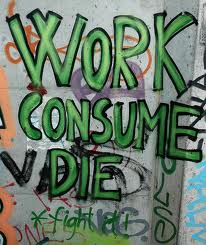Capitalist culture gives power and influence to business corporations and at the same time promotes and reinforces lifestyles and behaviours that are damaging to people and to the environment, particularly in English speaking countries. Of central importance are the underlying cultural imperatives for production and consumption.
 As we begin the twenty first century work, production and consumption have become ends in themselves.
As we begin the twenty first century work, production and consumption have become ends in themselves.
Since the 1950s, many households in affluent nations have moved beyond "a preoccupation with maintaining basic living standards to a concern with constructing lifestyles... People were invited to celebrate the market as the primary sphere of personal freedom and to see their consumer choices as extensions of themselves, ways of announcing who they were and wished to be". And in order to finance the ensuing consumerism, and maintain economic growth, people need employment.
Employment is such a priority that much environmental degradation is justified merely on the grounds that it provides jobs. And people are so concerned to keep their jobs that they are willing to do what their employers require of them even if they believe it is wrong or environmentally destructive. The social benefit of having the majority of able-bodied people in a society working hard all week goes unquestioned, particularly by those who work hardest. Few people today can imagine a society that does not revolve around work. They never stop to consider why they work and whether they want to work. How did paid work come to be so central to our lives? Why is it that so many people wouldn’t know what to do with themselves or who they were if they did not have their jobs?
As Dominique Méda observed in International Labour Review, work “has come to be regarded as an inherent feature of the human condition, as the only means of fulfilling all individual and social aspirations.” It “has come to dominate the entirety of individual and social time and space” and to be the “main vehicle for the formation of social relationships and for self-fulfilment”.
Employers have gone to a great deal of trouble to ensure this is so and they have been aided in their endeavours by governments, preachers, teachers, social scientists and others. To make sure there is no social identity outside of employment, the unemployed are stigmatised. They tend to be portrayed in the media as either frauds, hopeless cases or layabouts who are living it high at taxpayers expense. Work is seen as an essential characteristic of being human. No matter how tedious it is, any work is generally considered to be better than no work.